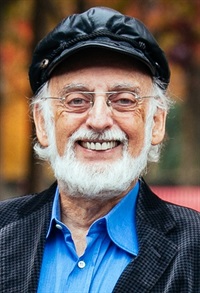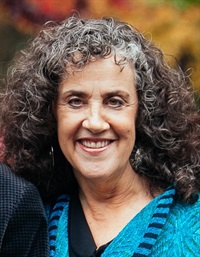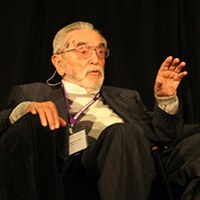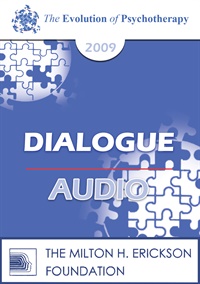EP09 Dialogue 15 – Healthy Marriage – John Gottman, PhD; Julie Gottman, PhD; and Salvador Minuchin, MD
- Average Rating:
- Not yet rated
- Topic Areas:
- Couples Therapy | Dialogues | Relationships | Therapist Development
- Categories:
- Evolution of Psychotherapy | Evolution of Psychotherapy 2009 | Pioneers in Couples and Family Therapy
- Faculty:
- John Gottman, PhD | Julie Gottman, PhD | Salvador Minuchin, MD
- Duration:
- 1 Hour
- Format:
- Audio Only
- Original Program Date:
- Dec 12, 2009
- License:
- Never Expires.
Description
Description: This discussion explores trust, repair, and relational resilience. The Gottmans share research on what sustains long-term bonds, including humor, gentleness, and shared meaning. Minuchin reflects on the architecture of secure relationships, addressing conflict, intimacy, and post-infidelity repair through a systemic lens.
Educational Objectives:
- Given a topic, to describe the differing approaches to psychotherapy, and to identify the strengths and weaknesses of each approach.
*Sessions may be edited for content and to preserve confidentiality*
Outline:
Introduction and Initial Remarks
-
Panel discussion on healthy marriage features John Gottman, Julie Gottman, and Salvador Minuchin
-
Audience invited to choose the first speaker; Minuchin is suggested
-
Topic framed around understanding "masters of relationship"
-
Introduces research spanning 20+ years, including studies on gay and lesbian couples
Empirical Research on Relationships
-
Emphasizes importance of representative sampling in relationship studies
-
Highlights findings on gentleness in conflict, particularly in same-sex couples
-
Introduces concept of "repair" in relationships, paralleling Edward Tronic’s mother-infant studies
-
Mentions Amber Tavares and Janny Driver's research showing how word choice affects conflict recovery
Salvador Minuchin's Perspective on Relationships
-
Presents the idea of "good enough" relationships and the "sound relationship house" model
-
Outlines seven core components: love maps, fondness/admiration, turning toward, positive sentiment override, conflict resolution, shared meaning, honoring dreams
-
Stresses mutual responsibility and respect as foundational to relational health
-
Describes therapist’s role as facilitating meaningful dialog between partners
John Gottman's Take on Relationships
-
Reflects on 58 years of marriage and the real-life complexities of long-term partnership
-
Highlights mutual responsibility as a critical factor in lasting relationships
-
Critiques the educational or prescriptive approach to therapy—automatic caring is more vital than learned techniques
-
Emphasizes practical skills over theoretical knowledge in building connection
Discussion on Therapeutic Approaches
-
Discusses therapy methods to create space for open, honest partner communication
-
Highlights the importance of emotional safety during sessions
-
Notes the centrality of relationship dynamics, mutual trust, and ongoing respect
-
Reinforces that successful therapy supports trust-building and shared responsibility
The Role of Positive Emotions in Relationships
-
Stresses need to cultivate positive emotional systems in couple dynamics
-
Cites affective neuroscience as key to understanding emotional bonding
-
Points to respect and curiosity as sustaining forces in long-term relationships
-
Notes tension between preserving individual identity and nurturing couple identity
The Role of Sex in Relationships
-
Question raised about the role of sex in committed partnerships
-
Sex varies widely between individuals and couples—no one-size-fits-all standard
-
Open communication about needs and desires is crucial
-
Emotional connection is shown to influence sexual satisfaction and desire
Final Thoughts and Audience Questions
-
Asked how to support couples recovering from infidelity
-
Recommends Shirley Glass’s Not Just Friends as a resource
-
Emphasizes need to build a “new relationship” rather than return to the old one
Credits
Handouts
| Timestamped Transcript (694.3 KB) | 15 Pages | Available after Purchase |
| Ericksonian Learning Snapshot (248.9 KB) | 2 Pages | Available after Purchase |
Faculty

John Gottman, PhD Related Seminars and Products
John Gottman, PhD, was one of the Top 10 Most Influential Therapists of the past quarter-century by the Psychotherapy Networker. Dr. Gottman is a professor emeritus in psychology known for his work on marital stability and relationship analysis through scientific direct observations, many of which were published in peer-reviewed literature. He is the author or co-author of over 200 published academic articles and more than 40 books, including the bestselling The Seven Principles for Making Marriage Work; What Makes Love Last; The Relationship Cure; Why Marriages Succeed or Fail; and Raising An Emotionally Intelligent Child, among many others.

Julie Gottman, PhD Related Seminars and Products
Julie Gottman, PhD, is the co-founder and President of The Gottman Institute, and Clinical Supervisor for the Couples Together Against Violence study. A highly respected clinical psychologist, she is sought internationally by media and organizations as an expert adviser on marriage, sexual harassment and rape, domestic violence, gay and lesbian adoption, same-sex marriage, and parenting issues. She is the co-creator of the immensely popular The Art and Science of Love weekend workshops for couples, and she also co-designed the national clinical training program in Gottman Couples Therapy.

Salvador Minuchin, MD Related Seminars and Products
Salvador Minuchin, MD, developed Structural Family Therapy, which addresses problems within a family by charting the relationships between family members, or between subsets of family. He was Director of the Philadelphia Child Guidance Clinic. Although it was minimally staffed when he began, under his tutelage the Clinic grew to become one of the most modeled and respected child guidance facilities in the world. In 1981, Minuchin began his own family therapy center in New York. After his retirement in 1996, the center was renamed the Minuchin Center. Dr. Minuchin is the author of many notable books, including many classics. His latest is Mastering Family Therapy: Journeys of Growth and Transformation. In 2007, a survey of 2,600 practitioners named Minuchin as one of the ten most influential therapists of the past quarter-century.


